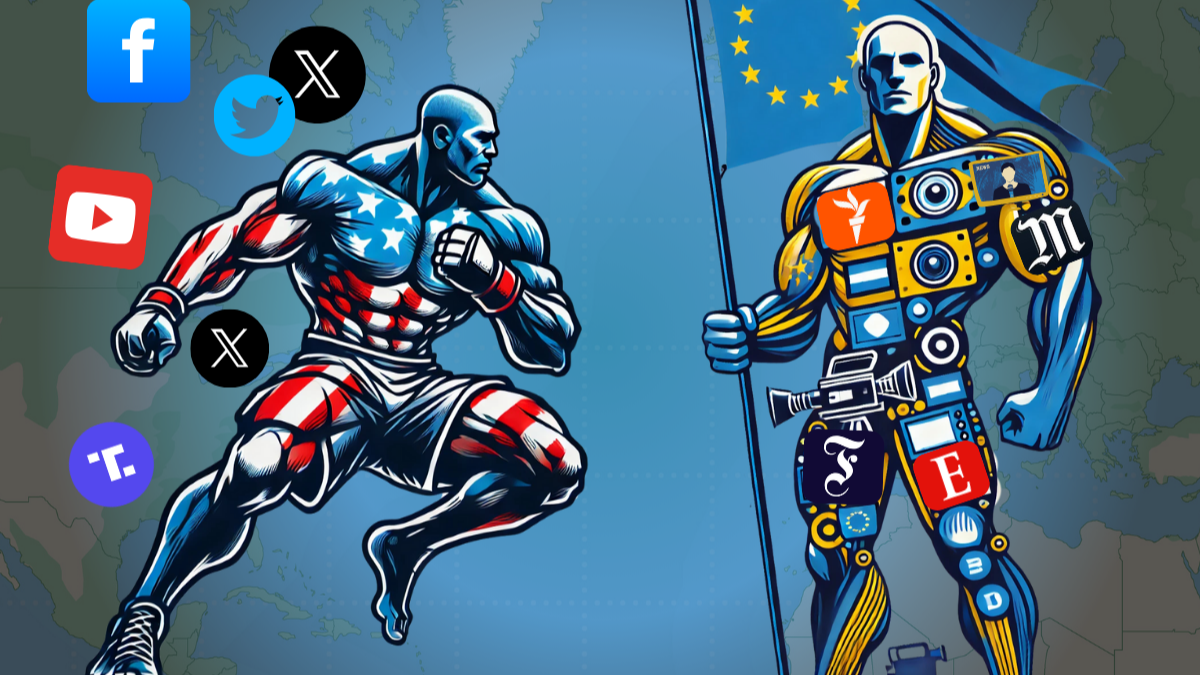As trade and military pressures multiply, Europe’s democracy is also undermined: the media sector is fragile and European platforms are absent. Under package deals, EU laws for the information ecosystem could be weakened: a collective countering is required. Civil society and businesses must complement public policies, to support journalism and European platforms.
Laws to safeguard our information space are in place since the last EU mandate, like the Digital Services and Markets Acts, the Media Freedom and AI Acts. But the hardball tactics of platform oligarchs and the Trump team leverage trade, defense and ‘free speech’: this might weaken the EU Commission’s enforcement.
Domestically, oligarchs and some governments tempted by Trumpism fuel populism. Mainstream parliamentarians can still stand for democracy. Chiefly, citizens and companies can fight back, help fund journalism, and usher new social media platforms.
Why it matters: more than laws, from boycotts to premium
Let’s examine new external threats, and how to best counter them. Elon Musk’s ‘X’ is a political toy more than a business. But Musk’s wealth depends on Tesla’s sales and shareholders’ satisfaction. Don’t take the carmaker’s board for granted: the leader was previously pushed out of Tesla’s chair, his compensation for a part-time role is controversial, and U.S. subsidies for electric cars stopped. The boycott of Tesla started strongly: sales are decreasing, and the share price drops, poorly propped up by rumors that Musk could leave government.
Meta joined that bandwagon, equating fact-checking and regulation with censorship, prioritizing Trump over ethics. Marc Zuckerberg, unlike Musk, has little ‘side business’. After the failed metaverse, the AI war is again costly and uncertain: this oligarch depends on ads. What if Europe’s advertisers started fleeing Meta? Actually, it nearly happened before.
In 2019, large advertisers worried about monetizing harmful content. So, US platforms preempted regulation, and contracted factcheckers. GARM (Global Alliance for Responsible Media) was influential – until legal and financial pressure by Musk in the US derailed it.
Europe, the second largest market for US platforms, holds financial leverage. Brands prefer to associate with quality content, and could pay a premium for journalist-curated news. Factchecking, trust indicators and due prominence for quality journalism: all this could boost media sales. Strengthening the information ecosystem and sustaining democracy.
What to do: Europe Democracy Infrastructure: media and social media
Europe cannot rely on foreign social media platforms. This element of strategic autonomy sounds too ambitious? Boeing was seen as natural monopoly before Airbus challenged it… and became the world leader. Our army of media dwarfs faces a rich oligopoly, these five points would be key:
1. Media cooperation: European media outlets must unite, pooling resources, creating a competitor to Apple News. And even merging when necessary: across borders, this actually strengthens pluralism. One pioneering move known to EU circles? The 12-country Euractiv network was brought into the group Mediahuis.
2. Content-sharing platforms and data centers:spreading part of coverage across wider audiences and languages would make media more competitive. This is underpinned by the advent of AI, and a prior feasibility study done for the EU’s DG CONNECT. Many publishers were reluctant so far: some now face cooperation or death…
3. Trust indicators influencing algorithms: replacing black or white ‘censorship’ with appropriate visibility. US platforms committed to them in 2018… in principle. European platforms could do it, replacing a low hanging fruit, ex-Twitter.
4. Alternatives to ‘X: So far central to the news cycle, it is shallow and the easiest to replace. The current Bluesky, Mastodon and Telegram are not strong alternatives yet.
5. EU calls for Trusted Platforms: The EU should fund and ‘trust-label’ media-sharing and microblogging platforms, attracting advertisers and investors. Initiatives like Euro-stack and TEMS (Trusted European Media Data Space) show the way.
How to achieve it? Media industrial strategy!
The 2025 Commission Work Programme and draft priorities for long term EU budgeting: both predate the Trump blitzkrieg. Just like for the new defense industrial strategy, the EU must act also for media at large, integrating six elements:
1. Strong ‘democracy shield’ to be spelled out by President von der Leyen in a democracy action plan. This should include firm implementation of existing legislation, instead of attempts at a package deal with trade issues
2. Clarify roles for both Democracy Commissioners that we stakeholders asked for:the ‘Executive Vice President for Digital Sovereignty, security and democracy’ and the ‘Commissioner for Democracy and Justice’
3. Support for Eastern European media & NGOs, especially as US-AID freezes funding and Radio Free Europe is questioned. They are on the frontline of democracy!
4. Priorities in the next EU financial framework (2027-2034): defense also from hybrid warfare, East and West: from Russia, China and potentially the USA itself. Both data infrastructure and media resiliency count. Notably R&D and innovation funding for platform creation and for media transformation. This can be a small fraction of the planned € 800 bn for defense.
5. Sovereign Funds in Tech & Media – EU-backed equity should close the investment gap with Silicon Valley. The new InvestEU AI fund sounds good, but the 5-year old idea of InvestEU NEWS should finally be launched.
6. Media sustainability check: this should be a key criteria when proposing new laws or checking existing ones (notably the Media Freedom Act, and the audiovisual media and copyright rules). Notably visibility for trustworthy information: trust indicators sustaining business models.
Plans will not suffice: actions speak louder. It’s time to move from endless pipelines of policy ideas to operational results. Europe is buzzing with ‘Trump-safe’ ideas, from discreet Commission task forces and MEP groups to think tanks and tech teams plus the trade counter-measures. Practical initiatives may be explained at the next Stars4media Day conference.
Politicians, businesses and citizens: let’s build together our democracy infrastructure!
Christophe Leclercq founded the media Euractiv and the think-do-tank Europe MédiaLab (Stars4Media). He was a member of the EU’s High-Level Expert Group on Disinformation, and is now on the Advisory Council of European Digital Media Observatory. He can be reached on LinkedIn, or at fondateur@europemedialab.eu .

